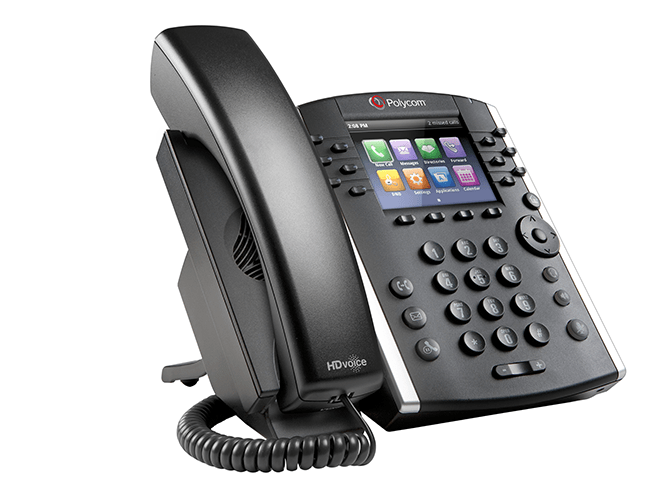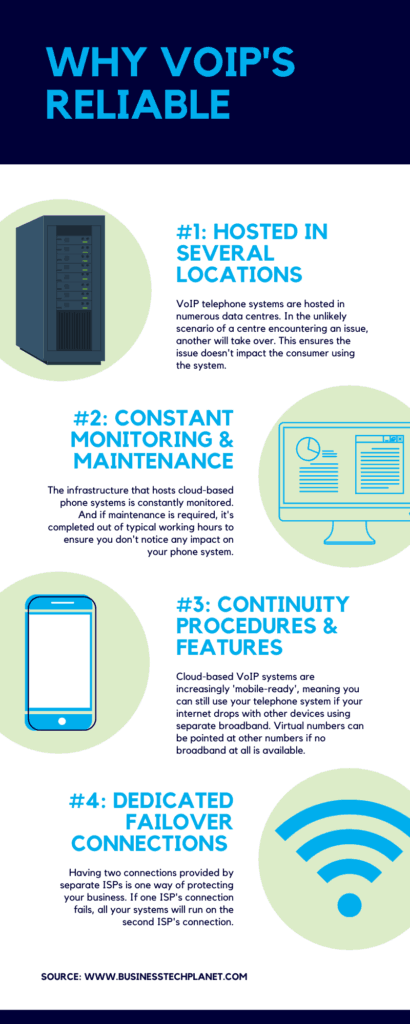If your business is moving over to a VoIP telephone system, you’ll probably need IP phones to effectively utilise your system in the office. While some may utilise softphones, most businesses want physical phones for their employees.
What is an IP phone? An IP phone is a physical office phone sits on a network. An IP phone stores its own information and has its own IP address.
The IP phone definition covers several types of phone, including desk phones, cordless phones, and conference phones. These phones closely resemble their analogue counterparts, so you’ve probably used an IP phone without knowing so. In this blog post, I’m going to explain how IP phones differ from analogue and answer several frequently asked questions about IP phones.
How Do IP Phones Work?
As we know, IP phones use the power of the internet rather than traditional telephone technology. IP phones receive analogue signals and converts them into digital signals, thereby enabling a conversation on the phone.
These digital signals are sent over a network cable and the signals are routed to the right location in your cloud-based telephone system. The way that the IP phones actually work doesn’t really matter, because you as the user will not notice a difference between IP telephony and traditional circuit-switched PSTN telephony.
So what does this actually mean, without the tech jargon? Essentially, an IP phone acts exactly the same as an analogue phone. The difference is analogue phones use the traditional phone network, whereas IP phones use the internet. To users, everything else is pretty much the same.
IP phones are designed to utilise the capabilities of a VoIP telephone system. VoIP systems are typically far more advanced than traditional phone systems, packed full of extra functionality. Therefore, these IP phones also have more functionality than standard analogue phones to accommodate the extra features available with a VoIP system. For example, IP phones allow for easy conference calling. They also have the expected functionality, such as hold, mute, redial and speed dial.
Where Can IP Phones Be Used?
Although you may primarily use IP phones in the office, you might be wondering whether they can be used elsewhere. For example, if you suddenly had to work from home, would you be able to take your IP phone with you and use it there?
One of the main benefits of a cloud-based telephone system is that you can use its full functionality no matter where you are. Similarly, you can use your IP phone wherever you are, providing you have power and an internet connection.
You can unplug your IP phone in the office and plug it in anywhere else, such as at home. Once the device is plugged back in, all of its settings will be completely unchanged. You’ll still have the entire functionality available to you that you would if you were in the office.
If you have employees working remotely or you’ve moving offices, the fact you can plug an IP phone in anywhere is perfect. In the moving office scenario, you can take the time to get your new office right while your employees can work from home and remain productive.
If you wanted to get really fancy, you can have one IP phone at home and one at the office. These would function identically, with the same settings, and you could pick up the phone on either. This is perfect for ensuring you don’t miss any calls. It’s particularly ideal if you split your time between the office and your home office.
Does Moving Over To IP Phones Mean Retraining Staff?
While IP phones are cost-effective, future-proof, and offer great flexibility, you might wonder how much training your staff will need when you introduce them.
Fortunately, your staff won’t require a great deal of training if you move over to a VoIP telephone system and IP phones. Most IP phone functionality is identical analogue phones, so your staff will already be familiar with how they work.
Despite the fact that IP phones are very similar to analogue phones, what if you have staff that require training regardless? In my experience, VoIP providers usually offer free training on how IP phones work for those who want it as part of the initial set up. There are also hundreds of guides out there that offer detailed instructions on how a typical IP phone functions.
One good aspect of IP phones are that they’re future-proof. IP phones are built to last and VoIP telephony is the future for every business. Once your team know how to use IP phones – which shouldn’t take long – you’ll never have to train them to use phones again. IP phones are here to stay, so if you invest in them now, you’ll never have to invest again.
Do I Need IP Phones If I Have A VoIP Telephone System?
If you’re in the process of moving over to VoIP, you may be wondering whether you can use your existing analogue handsets for VoIP instead of investing in new handsets.
If you want to use handsets, you do need IP phones if you have a VoIP telephone system. Most providers will lease you the IP phones as part of your agreement, meaning setting up your system won’t be as expensive as you might think. There’s no need to buy handsets. You can instead lease them for as long as you need them.
If you don’t want your team to use handsets with your VoIP telephone system, you could use softphones instead. A softphone is an application that can be installed on any internet-enabled device with a microphone and a speaker. A softphone allows you to make and receive calls via devices such as mobile phones, laptops, tablets and PCs. If you’re keeping a keen eye on costs, this is the most cost-effective way to set up a VoIP telephone system for your business.



